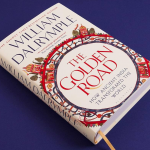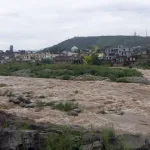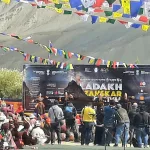PRESERVE MOTHER TONGUE
Language is the thread that brings members of a community together, a living bridge that carries culture, shared stories, and a sense of belonging. When we speak in our native tongue, we aren’t just communicating we’re immersing ourselves in a world of values, customs, and histories unique to our community. Language shapes who we are, creating a powerful connection that binds us to one another and to our cultural identity. By preserving and sharing our languages, we hold onto the very roots that make each community vibrant and unique.
The current state of the Kashmiri language is a challenging one, marked by neglect and diminished status. If the Kashmiri language were personified, it would be a leper, marginalized and struggling for survival. Increasingly, society perceives Kashmiri as a language of lower status, while fluency in English has become a point of pride, reflecting a continuous subconscious colonial influence. Just a decade ago, Urdu held a prestigious position among Kashmiri society. Today, it has become mainstream, and English has taken its place as the language of status. In this shift, Kashmiri, the language that embodies the region’s heritage and identity, faces the risk of being overshadowed and forgotten.
Our society is caught in a relentless race for success, where everyone feels pressured to stand out. Parents, anxious about their children’s future, often view language as a marker of achievement. Many fear that if their children don’t excel in widely recognized languages, they might fall behind or be judged as below average. However, there’s a need for greater awareness about the importance of a child’s mother tongue. Learning it doesn’t just ground them culturally; it also enhances cognitive skills, which in turn supports academic growth and the ability to learn other languages.
I recall a visit to the hospital with my grandfather when he was unwell. The doctor attending him was a junior doctor with no Kashmiri language skills, and what I observed was both surprising and unsettling. Patients were forced to resort to gestures and actions to explain their problems, and even when the doctor seemed to understand, he struggled to communicate his advice back to them clearly. This experience shows the widening language gap between generations and highlighted how crucial language fluency is in such essential, life-impacting interactions.
The question we must ask ourselves is; who bears the responsibility for this decline? The blame often shifts from one to another, yet the reality is that the Kashmiri language belongs to everyone within its geographic embrace. It’s a shared heritage, a home, and with its erosion, we risk losing an irreplaceable part of ourselves.
One of the greatest tragedies in this decline is the threat to our literature and oral traditions. Who will read the verses of Sheikh Noor-ud-din (RA), Shamas Faqir (RA), Rahim Saeb, and Lalla Ded when their language no longer lives among us? These poets, philosophers, and mystics built the foundation of our cultural identity; their words carry the wisdom, spirituality, and history of our people. Our language is present into every aspect of our lives, from ancient verses to the joyous songs of our weddings, where Kashmiri ‘wanwun’ breathes life into celebrations like weddings. Its loss is not just the loss of a language; it is the fading of our collective memory, the vanishing of a voice that has long spoken our history, values, and identity.
Personally, I feel a pang of regret for not being able to read and write Kashmiri fluently, even though I speak it fluently as my mother tongue. Unfortunately, our generation missed out, as Kashmiri was not taught in schools in our time and didn’t receive the attention it deserved. It’s time we change that for future generations, recognizing the irreplaceable role our language plays in shaping who we are.
It is envious to see those who can effortlessly enjoy literature in their own language, while people like me are left piecing together alphabets that miss half the magic. In our community, speaking languages like Urdu or English has become a fashionable choice, a trend that reflects being modern. However, we must remember that trends come and go, while native language forms an enduring foundation. It’s what grounds us, connecting us to our ancestors.
The answer, ultimately, is that there’s no single party to blame; it’s not just my problem or your problem, but our problem. We must tackle this issue together by addressing its root causes. Learning a mother tongue begins at home, with parents setting the foundation for language and culture. Yet, many parents often point fingers at the government, claiming responsibility for the lack of emphasis on our language in the school curriculum. They lament that our leaders predominantly speak in Urdu or English, overlooking that they do the same in their daily lives, reinforcing the very trend they criticize.
It’s a classic case of wanting the best of both worlds, demanding change while clinging to old habits! Furthermore, the government must frame policies that prioritize and protect our cultural foundations, especially when the very essence of our identity is at stake. For instance, public spaces could prominently feature signs and instructions in Kashmiri, followed by other convenient languages. This would not only validate our language but also reinforce its significance in everyday life. It is more than just an individual effort; it’s a shared responsibility to reclaim and nurture our cultural heritage.
We can draw inspiration from developed nations that prioritize their languages, embedding them deeply within both public and private spheres to ensure their sustained presence. In India, states like Karnataka, Kerala, and West Bengal, provide exemplary models of linguistic pride and preservation by mandating the use of regional languages in public signage and official communication. To truly revive our mother tongue, we need to come together as a society, creating spaces for Kashmiri to flourish in our homes, schools, and public life. Only through unity and collective action can we preserve this essential link to our identity and safeguard its legacy for future generations.
Encouraging research in Kashmiri literature and fostering a thriving print media dedicated to the language could be transformative. By supporting academic exploration of Kashmiri literature, we can cultivate a deeper appreciation of our literary heritage. Introducing Kashmiri-language newspapers and magazines would offer students and writers platforms to express their voices and ideas in their mother tongue. Celebrating and recognizing students and researchers for their contributions in this field can inspire more young people to engage with and take pride in their linguistic roots, creating a renewed sense of community and identity.
(Author is a researcher and poet with her research focus on culture, arts and aesthetics. She has an interest in exploring Kashmiri culture and is dedicated to promoting environmental sustainability. Feedback: [email protected])








